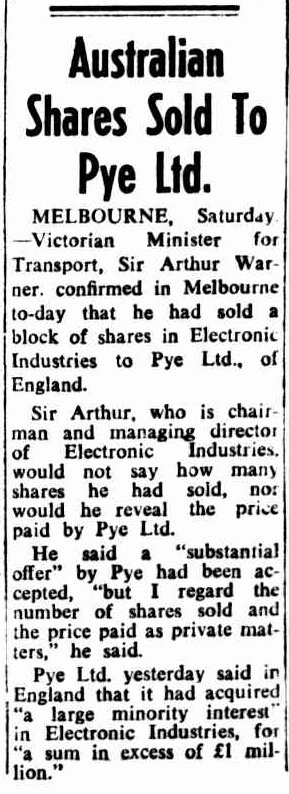Historical Features
Forum home - Go back to Historical Features
|
The Rise And Fall Of Astor
|
|
|
« Back ·
1 ·
Next »
|
|
|
Return to top of page · Post #: 1 · Written at 8:14:33 PM on 28 January 2015.
|
|
|
|
Location: Ballarat, VIC
Member since 4 January 2011 Member #: 803 Postcount: 456 |
|
THE RISE AND FALL OF ASTOR  Myth Number 2. The origins of Astor lie with the company known as Clarke and Hagblom who manufactured condensers. Again, there is no evidence to support this. Clarke and Hagblom was formed in 1923 by Fred Clarke and Axel Hagblom to manufacture variable condensers. The company traded from a different address than Louis Coen Wireless and there was no direct business connection at the time. The confusion here is due to the way Louis Coen Wireless expanded into Radio Corporation. As part of this expansion, the company formerly known as Clarke and Hagblom was acquired. This will be discussed in more detail in a later article. Coming next: Part 2 - Astor - The early years, 1923 to 1929 |
|
|
Return to top of page · Post #: 2 · Written at 1:09:01 PM on 29 January 2015.
|
|
|
|
Location: Melbourne, VIC
Member since 5 October 2009 Member #: 555 Postcount: 470 |
|
Hi TV Collector, ‾‾‾‾‾‾‾‾‾‾‾‾‾‾‾‾‾‾‾‾‾‾‾‾‾‾‾‾‾‾‾‾‾‾‾‾‾‾‾‾‾‾‾‾‾‾‾‾‾‾‾‾‾‾‾‾‾‾‾‾‾‾‾‾‾‾‾‾ Cheers, Ian |
|
|
Return to top of page · Post #: 3 · Written at 8:27:41 PM on 29 January 2015.
|
|
|
|
Administrator
Location: Naremburn, NSW
Member since 15 November 2005 Member #: 1 Postcount: 7605 |
|
The move to manufacturing televisions hit most of the companies hard. Many over-invested in the tooling up process and didn't bargain on the scenario that televisions were ultimately more expensive than radios. People didn't buy them at the same pace as radios and there was something even more expensive that people wanted to buy and this also displaced the television industry a bit - post war families had somewhere to live but grew tired of walking to work or using the tram system that governments were cutting away, so more and more families got acquainted with the motor car. Holden was getting all the money that would have gone to AWA, Philips and Astor. ‾‾‾‾‾‾‾‾‾‾‾‾‾‾‾‾‾‾‾‾‾‾‾‾‾‾‾‾‾‾‾‾‾‾‾‾‾‾‾‾‾‾‾‾‾‾‾‾‾‾‾‾‾‾‾‾‾‾‾‾‾‾‾‾‾‾‾‾ A valve a day keeps the transistor away... |
|
|
Return to top of page · Post #: 4 · Written at 10:21:58 PM on 29 January 2015.
|
|
|
|
Location: Ballarat, VIC
Member since 4 January 2011 Member #: 803 Postcount: 456 |
|
Astor did have a good feel for the electronics boom to come and were able to take full advantage of it. |
|
|
Return to top of page · Post #: 5 · Written at 12:16:09 AM on 22 February 2015.
|
|
|
|
Location: Silver City WI, US
Member since 10 May 2013 Member #: 1340 Postcount: 977 |
|
Pye's shareholding in Electronic Industries was later reported as being around 45% and as such did not constitute as being a controlling interest. |
|
|
Return to top of page · Post #: 6 · Written at 10:04:39 PM on 3 January 2017.
|
|
|
|
Location: Mordialloc, VIC
Member since 3 January 2017 Member #: 2032 Postcount: 1 |
|
My dad, Stan Curnow, worked for Radio Corporation, and then Phillips from about 1948 to 1980. He initially worked as a toolmaker, making the dies for several radio enclosures and later a maintenance fitter. |
|
|
« Back ·
1 ·
Next »
|
|
|
You need to be a member to post comments on this forum.
|
|

Sign In

Vintage Radio and Television is proudly brought to you by an era where things were built with pride and made to last.
DISCLAIMER: Valve radios and televisions contain voltages that can deliver lethal shocks. You should not attempt to work on a valve radio or other electrical appliances unless you know exactly what you are doing and have gained some experience with electronics and working around high voltages. The owner, administrators and staff of Vintage Radio & Television will accept no liability for any damage, injury or loss of life that comes as a result of your use or mis-use of information on this website. Please read our Safety Warning before using this website.
WARNING: Under no circumstances should you ever apply power to a vintage radio, television or other electrical appliance you have acquired without first having it checked and serviced by an experienced person. Also, at no time should any appliance be connected to an electricity supply if the power cord is damaged. If in doubt, do not apply power.
Shintara - Keepin' It Real · VileSilencer - Maintain The Rage
